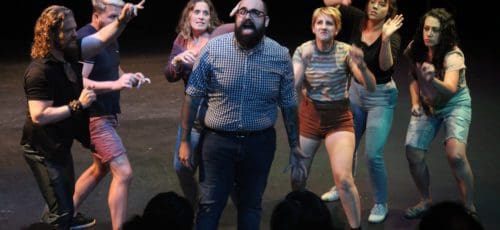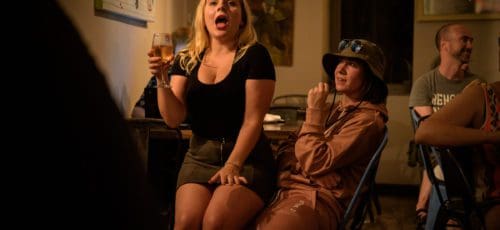Playing Objectives
Domenick Scudera has a regular Festival Blog column about his experiences in the performing arts. He is a longtime theater artist and is the chair of the theater and dance department at Ursinus College.
 When you are in the theater biz, you will say yes to any job. If someone needs an actor to recite a Hamlet soliloquy at the opening of a gas station, you are there. As a director, I have agreed, time and time again, to my share of low-paying, potentially humiliating productions. Some call it paying dues, but when I take each lousy job, I convince myself that I am doing Very Important Work. Work that no one will see, but nonetheless, I want to believe I am creating Art for Art’s sake.
When you are in the theater biz, you will say yes to any job. If someone needs an actor to recite a Hamlet soliloquy at the opening of a gas station, you are there. As a director, I have agreed, time and time again, to my share of low-paying, potentially humiliating productions. Some call it paying dues, but when I take each lousy job, I convince myself that I am doing Very Important Work. Work that no one will see, but nonetheless, I want to believe I am creating Art for Art’s sake.
One such gig was directing a skit in a sports stadium for the opening ceremonies of Special Olympics Pennsylvania. I was offered the job through the recommendation of a friend of a friend who had seen a production of The Pajama Game I had directed the previous summer. I had never been to a Special Olympics and, at that point in my life, I had not given much thought to helping others in any way. But this particular gig paid $200, so I said yes. I wanted to believe it was Art (with compensation!), but the script was terrible. It was a poorly constructed fairy tale about a little girl climbing a mountain, running into trolls and obstacles before reaching the summit and planting a flag. It was thin material, but it would run less than fifteen minutes and would not require much rehearsal time. Doing the math, it seemed $200 was a fair sum for this Art.
But after the jump: Special revelations for director and cast.
I cast the show from amongst my friends. They did not mind the tidy little sum they were going to make, either. They hated the script more than I did. All of us were young and applied our theater training to everything, but it was difficult to infuse too much Stanislavski motivation into the character of a troll blocking a girl from climbing a mountain.
TROLL 1: “You cannot pass.”
GIRL: “But I must!”
The actor playing the Girl kept complaining that we needed to re-write the script to make it more complex. She desperately wanted to add some subtext or new tactics:
TROLL 1: “You cannot pass.”
GIRL: “To pass or not to pass, that is the question.”
But it was one of those scripts that had been approved by committee—special Special Olympics people, I guess—and we could not alter it. Discouraged, she and the actors half-heartedly rehearsed and barely memorized their lines. My direction was not creative or inspiring. A minimum effort, and my $200 was in the bank.
After a one-week, lackluster rehearsal period, we gathered at the stadium to finish the job. We knew we had to sit through a lengthy opening ceremony, so we huddled behind the set—a hastily constructed, cartoon mountain with stairs on the side and a little platform on the top. It was crude but so was the acting, so who cared? We waited not-so-patiently.
The stands filled up with the athletes’ family and friends. I took a peek around the mountain and discovered that the crowd was huge. Were we going to perform this terrible little play for all these people? I had assumed this was one of those gigs that no one would see. It had not occurred to me that there might be thousands watching. I suddenly wished I had rehearsed the actors more rigorously—or at least demanded that they learn their lines. It was going to be cringe-worthy. Was the humiliation really worth the $200?
The athletes marched into the stadium. Just like the international Olympics, they marched in groups to cheering crowds, taking their places on the field. Hundreds of athletes. Maybe thousands. It was overwhelming. It had never occurred to me who we were preparing this play for. The Special Olympians—kids with Down Syndrome or other intellectual disabilities—were beaming with excitement, walking with dignity. This was an important moment in their lives. Now I was really regretting that we were going to present this pathetic little play. The actors, too, felt new pressure and began running their lines over and over again.
After the march of the athletes was complete, there were some requisite speeches, applause and so on. Then—finally—the audience was asked to turn their attention to the plywood mountain next to the podium for a short play.
We were on.
In addition to directing, I was also responsible for running the sound—remember, I was paying my dues. The sound board was placed behind the mountain, so I could not see the action. I started the opening music cue, and the Girl walked around to the front of the stage, performing her perfunctory opening monologue as she had rehearsed. “Oh my. This mountain is so tall!” she recited flatly. She then proceeded to “climb” the mountain. Two Trolls leapt up and stopped her:
TROLL 1: “You cannot pass.”
GIRL: “But I must!”
TROLL 2: “We will not let you pass!”
GIRL: “I do not need your permission! Nothing can stand in my way!”
The actors played through the next action smoothly: the Girl outwits the Trolls and moves to the next level of the mountain. As this first section of the play was completed, I heard a huge response from the audience. What was going on? I played the next sound cue as the two Trolls came off the stage. They were shaking with excitement, looking stunned. “What happened?” I asked.
“They love the little girl! When she moved past us, they went wild!”
The Girl continued on, facing and overcoming other obstacles. The play, which we had perceived as inferior, now filled with significance. The Trolls and Monsters barring her way were metaphors for the perceived disabilities of the athletes—aha! This Girl was overcoming everything in her path. She was unstoppable!
And I, the director, had not realized the meaning of the play until this moment.
Bigger and more sustained hoots emanated from the audience and the field as the Girl moved up the mountain. When she reached the summit and planted her flag, the entire stadium erupted. Our sappy little play was no longer sappy, it was Art. Healing, validating, community-building Art. Theater as it should be.
After multiple curtain calls, the actor playing the Girl came around to the other side of the mountain. Overwhelmed, she was crying. She, too, had thought she was paying dues in a meaningless skit, but, instead, she was washed over with love from the audience. Somewhere halfway up the mountain, she knew that she was representing these kids and their collective struggles. She was Every Olympian. Stanislavski trains actors to play their characters’ objectives truthfully, so she strove to achieve her/their goal in a most genuine, earnest way. When she reached the summit triumphantly, she and every athlete achieved their objective together. It was truly Special.
–Domenick Scudera
For information on how to support Special Olympics Pennsylvania, visit their website. For a group that transformed how your increasingly humble blog manager perceives people with intellectual disabilities, check out Back to Back Theatre. They’ll return to the Live Arts Festival this fall. —NG.


